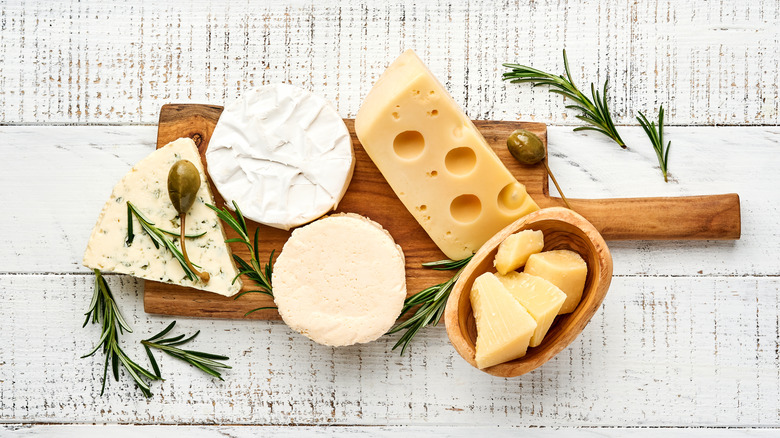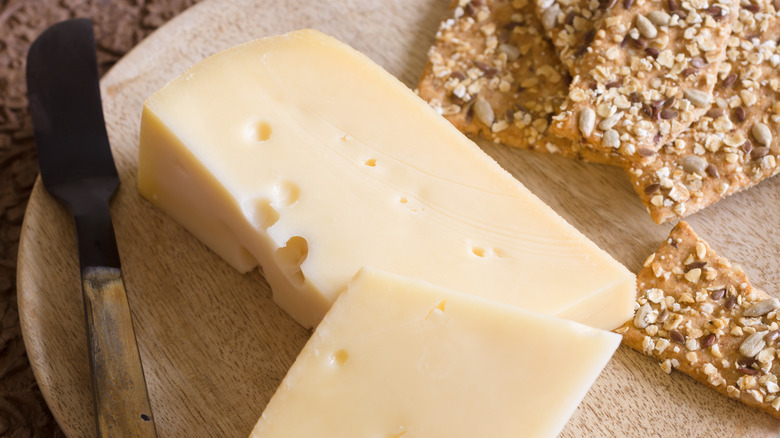New Study Reveals How A Nordic Cheese Could Improve Bone Health
Step aside, Camembert. There's a new giant on the charcuterie board with major flavor and — according to a recent study — impressive health benefits, to boot. No cheesehead could forget the fateful year of 2017, when Camembert nearly fell into extinction after farmers across France began to tire of the cheese's laborious making-process (via Bloomberg). Now, though, Camembert is back — but not without some competition: And its name is "Jarlsberg."
According to the authority at Cheese.com (yes, really), Camembert is a soft French cheese made from cow's milk with a buttery, sweet flavor and earthy aroma. Similarly, Jarlsberg – named after a town in Norway — describes its cheese as a mix between Gouda and Emmental, with a porous semi-soft texture, and a nutty, mild flavor. But, the unique cheese isn't just an unexpected accoutrement to your wine tasting. A recent study by a team of Norwegian researchers found that eating just one serving (about 57 grams) of Jarlsberg cheese per day can measurably improve bone health.
So, for two cheeses so similar, what set Jarlsberg apart?
Jarlsberg is packed with vitamin K2
Although Jarlsberg and Camembert boast comparable fat and protein levels, Jarlsberg is rich in one key nutrient that Camembert lacks: vitamin K2. According to Healthline, vitamin K2 was discovered during the early-20th century by dentist Weston Price amid his travels to determine the relationship between different cultures' diets and disease. News of the discovery was also published in a 1929 German scientific journal, where it was called "Koagulationsvitamin" (responsible for the namesake "K"). The way vitamin K2 works, explains Healthline, is by activating enzymes in the body that reduce blood clotting and regulate calcium deposition, which makes bones stronger and denser and keeps blood vessels free-flowing.
The recent study, led by Dr. Helge Einar Lundberg of Skjetten Medical Center in Skjetten, Norway, aimed to determine whether Jarlsberg cheese contained enough vitamin K2 to substantially promote bone health. For six weeks, a team of Norwegian researchers studied a group of subjects who ate either 57 grams of Jarlsberg cheese or 50 grams of Camembert cheese each day, explained the publication in scientific journal BMJ Nutrition, Prevention & Health. Then, the researchers took blood samples to measure the subjects' levels of osteocalcin and a peptide (PINP), which are key proteins in promoting bone health and density.
For the group that ate Camembert, PINP levels remained the same and other bone-healthy factors dropped — but, in the Jarlsberg group, all levels significantly increased.
Say cheese -- your bones will thank you
Vitamin K2, says Healthy Directions, is found in some animal products and in fermented foods, like cheese, and researchers have been studying its impact on bone health for years. A 2006 study published in the National Library of Medicine found that vitamin K measurably prevented bone fractures among subjects who took oral supplements of the vitamin. Now, in a media release published in BMJ Nutrition, Prevention & Health, the Nordic researchers conclude, "Daily Jarlsberg cheese consumption has a positive effect on osteocalcin, other BTM (markers of bone turnover), glycated hemoglobin and lipids."
It's important to note, however, that this study was considerably small and limited: The test group was solely composed of 66 females around the same age, health, and weight. Still, Professor Sumantra Ray, Executive Director, NNEdPro Global Center for Nutrition and Health, champions the importance of these findings. "This study shows that while calcium and vitamin D are known to be extremely important for bone health, there are other key factors at play, such as vitamin K2, which is perhaps not as well known," Ray said in a media release, via Study Finds.
As Healthline explains, the vitamin isn't a major player in the Western diet, which grants greater media coverage to other nutrients. But, in light of these recent findings, perhaps Jarlsberg will emerge as the tasty little package to bring vitamin K2 to the table for good.


